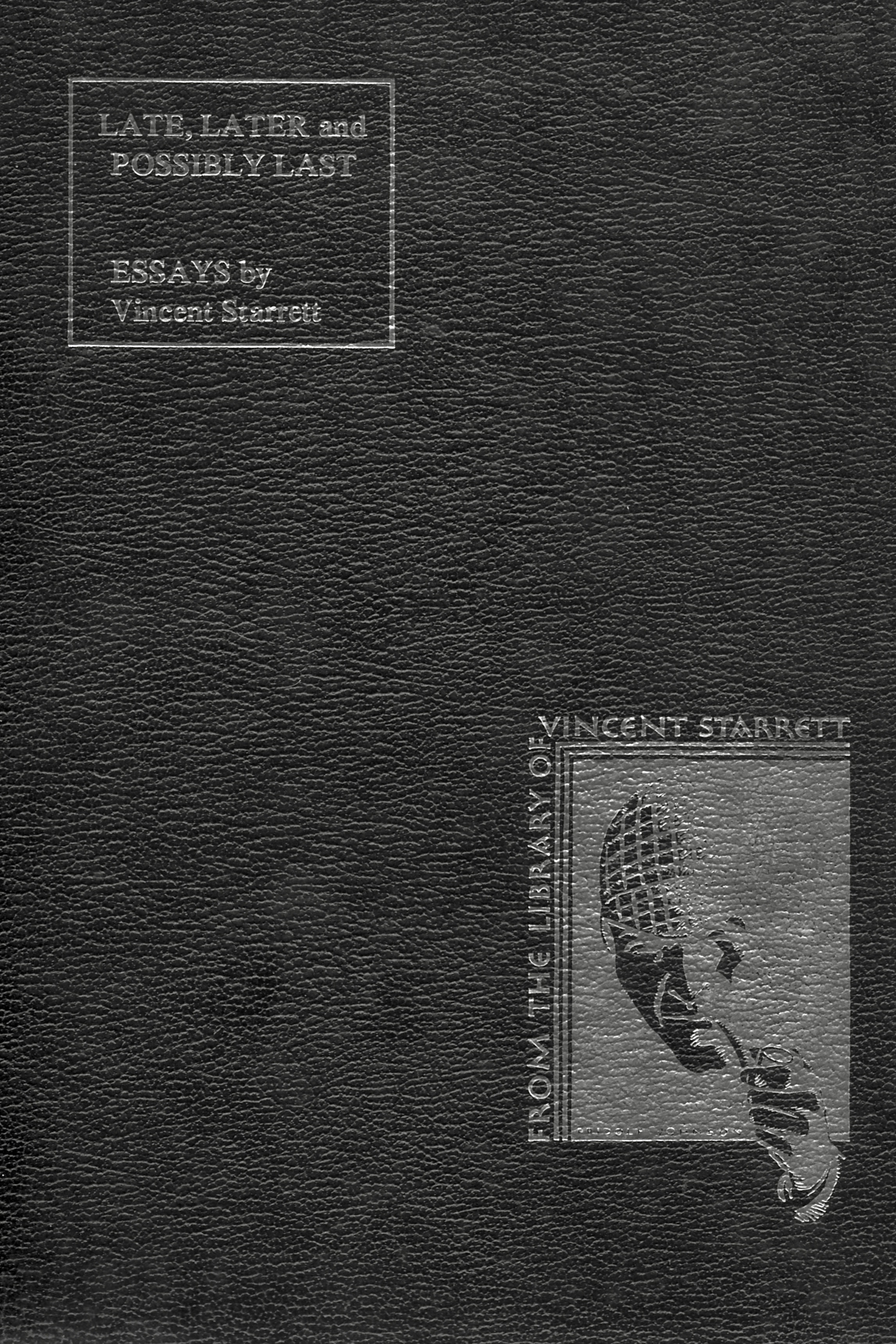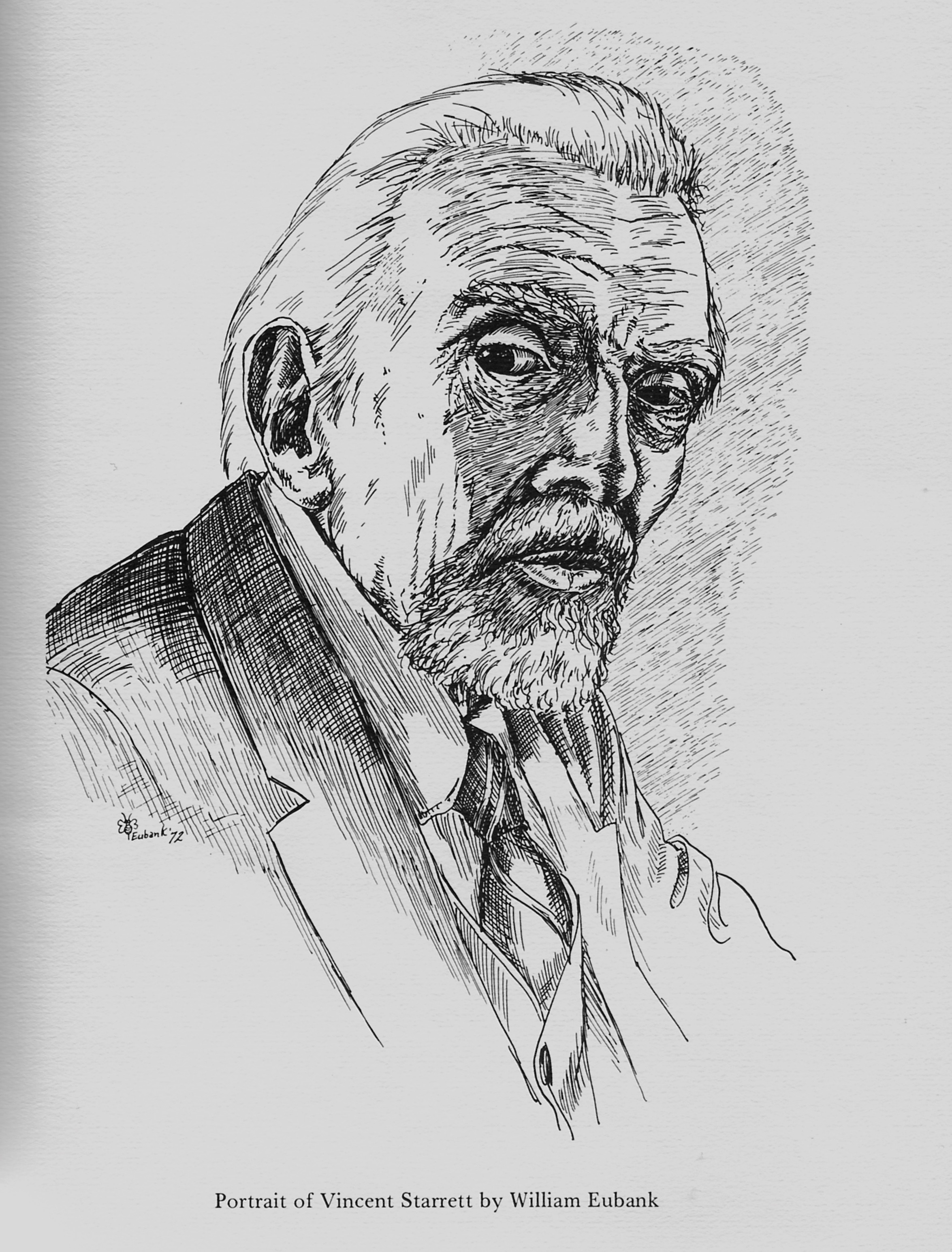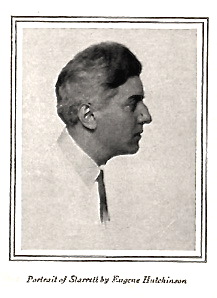Wilder, Hardwick and an order of Thai
Whose Private Life is this?
Scenes from Billy Wilder’s “The Private Life of Sherlock Holmes” from The Films of Sherlock Holmes by Chris Steinbrenner and Norman Michaels. (Note the page number.)
That “Other” Private Life


Vincent Starrett rarely had a healthy bank account, but that’s not because The Private Life of Sherlock Holmes failed to sell well. In fact, if there’s any book of his that earned money over the course of his lifetime, it was Private Life. So it probably should not have been a surprise to learn that the book had enough of a reputation to attract the attention of Hollywood.
Well, that’s not exactly right. It wasn’t so much Starrett’s book that Hollywood wanted. It was his title.
I’m sure most of you know that you can’t copyright a title. So when Billy Wilder was looking for a name for his unorthodox Sherlock Holmes feature film, he used The Private Life of Sherlock Holmes.
The truth is that the title fits the film, since we learn more about the private details of Holmes’ life than we ever got from Dr. Watson’s narratives. (For those who have yet to see the film—and if you are interested in Holmes you really should hunt down a copy—I’ll try not to spoil it further.)
While he wasn’t paid anything, the old bookman received one consideration from the folks behind the film: He was invited to the Chicago premiere of the 1971 film. We have a lengthy description of this event that Starrett first published in the Chicago Tribune Magazine on August 22, 1971.
The essay was then reprinted in Late, Later and Possibly Last, a short anthology published by Autolycus Press of St. Louis in 1973.
A Night on the Town
Vincent Starrett by Gene Markey in 1919, showing how he once went out on the town as a literary lion and critic.
Starrett starts by describing how he once got ready for a night out in Chicago.
“In the past, theater nights were when I wore a chesterfield and kidskin gloves, brandished a cane and snuggled a silver flask of brandy in my pocket. I played the role of literary lion, played and parlayed, and flourished apace with sometime heavy irony or frothy sarcasm. I made no friends, or unmade friends and gathered enemies along the way. I was an awkward lion, totally unsympathetic.”
That was 50 years earlier. This was a different era as he and his cabbie drove through the unforgiving Chicago winter. The cabbie, according to Starrett, understood his disappointment over seeing a film with his title getting attention for others.
Cabbie: “So they don’t pay you nothing,”
Starrett: “That’s right.”
Cabbie: “The bastards.”
Starrett: “That’s right.”
At the theater, Starrett was ushered into a comfortable “almost luxurious screening room” which was filled with Chicago Sherlockians, who rose as one and applauded their acknowledged lion.
“Well, when you pass the age of 84, you expect applause whenever you get your shoes tied,” Starrett comments drolly.
Memories of Rathbone and ‘221B’
What did he think of the film? Starrett was impressed with Wilder’s technical skills, his affection for the subject which was “manifest in the careful, well-researched re-creations, in the lodgings at 221-B, in Baker Street itself (obviously he had consulted photographs of the period).”
Starrett was not a fan of the suggestion that Holmes was gay, but he does not discount its place in the film or Wilder’s handling of the topic. It simply was not what Starrett, who was born in the Victorian era and never really left it in some ways, would have wanted to see discussed in a public setting.
In the cab ride back home, Starrett reflected on all the many actors he had seen portray Holmes, from Gillette—both on stage on film—to his friend Basil Rathbone. Back in his warm room, Starrett picked up a printed copy of his poem “221B.”
A 1967 photo showing Starrett, Rathbone and Chicago Sherlockian Robert Hahn.
“The paper was worn and brittle and the printing showed broken type and uneven leading. But it was a poem that Basil had recorded and loved. I read it aloud for Basil and with his voice in mind, and read it strongly because I wanted him to hear it again if he could.”
As I have said before, there is something sad and lovely about this scene: The old bookman reading a sonnet for a friend who was no longer alive. Could Rathbone hear Starrett’s recital? Why not?
After all, “Only those things the heart believes are true.”
Let’s leave him there with his brittle piece of paper and his memories.
That Other Private Life Book
Once again, The Private Life of Sherlock Holmes graces the cover of a book. But it is not Starrett’s well-known classic, but an adaptation of Billy Wilder’s film.
Wilder’s film brought with it a few spinoffs, most notably a novelization written by Michael and Mollie Hardwick, published in paperback editions in both the United States and England.
Americans probably best knew the Hardwicks for their novelizations of Masterpiece Theater imports like “Upstairs, Downstairs,” and “The Duchess of Duke Street.” The Hardwicks also had a history of adapting Holmes stories for other media in England.
The novelization is faithful to the film, with Watson narrating the larger part of the tale. However, at one point he asks Holmes for notes on what happened one night while Watson was asleep and a young woman under their protection was sleeping in Holmes’ room.
“I had risen to my feet, and now stepped quickly into the patch of shadow beyond the dying firelight’s gleam as she came into the room. She was what I can only describe as naked.”
Having read the entirety of the Holmes canon, I can only say that such a sentence would not have come from Watson’s or Conan Doyle’s pen. It does, however, give you a sense of what to expect should you pick up a copy of the book.
I’ll leave it up to you to judge its merits.
Watson Has a Turn
Watson gets his own Private Life courtesy of Michael Hardwick.
Perhaps it was the success of these projects that sparked another: The Private Life of Dr. Watson: Being the Personal Reminiscences of John H. Watson, MD.
Published in 1983 by E.P. Dutton, Inc. of New York, the book is a free-wheeling trip through Watson’s background, with sometimes outrageous pre-Holmes adventures.
More than one person familiar with Michael Hardwick’s life noted the similarities between his life and Watson’s. I don’t know about that, but I did have a hard time accepting the love affair between Watson and actress Sarah Bernhardt:
“ ‘John,’ I heard her voice, in that vibrant timbre which seemed to convey a kiss in every word. ‘Come to me.’
I followed the sound to its source, and found her awaiting me.
She was in her coffin.”
You get the drift.
Hardwick’s Watson tale came as the Holmes boom sparked by Nick Meyer’s The-Seven-Percent-Solution was fading, only to be kickstarted again by Jeremy Brett and company. A British edition The Private Life of Dr. Watson was published in 1985 by Weidenfeld and Nicolson, as the Brett adaptations were catching fire.
Although popular in its day, the book has not been reprinted to my knowledge.
The Thai Edition
A Thai edition of Wilder’s film adaptation.
Could there be an unknown edition of Starrett’s Private Life out there?
I doubt it, but I’ve been fooled before.
A book popped up on my eBay alerts a few years back called The Private Life of Sherlock Holmes. No author was given. Intrigued, I tried to get more information, only to find out the book was in a foreign language.
The price was right, so I took a chance. Could this be an unknown translation of Starrett’s work?
Alas, no.
After a few experiments with Google translator, it turns out this was a Thai language edition of the Hardwicks’ novelization of Billy Wilder’s film.
Cool cover though.
